Research Methodology Assignment
VerifiedAdded on 2023/06/10
|5
|835
|313
AI Summary
This assignment discusses the vulnerable group in the article, which is people with dementia, and the ethical issues discussed in the reviewed article. It also provides strategies for addressing ethical issues and their effectiveness. The subject is research methodology, and the course code, course name, and college/university are not mentioned.
Contribute Materials
Your contribution can guide someone’s learning journey. Share your
documents today.
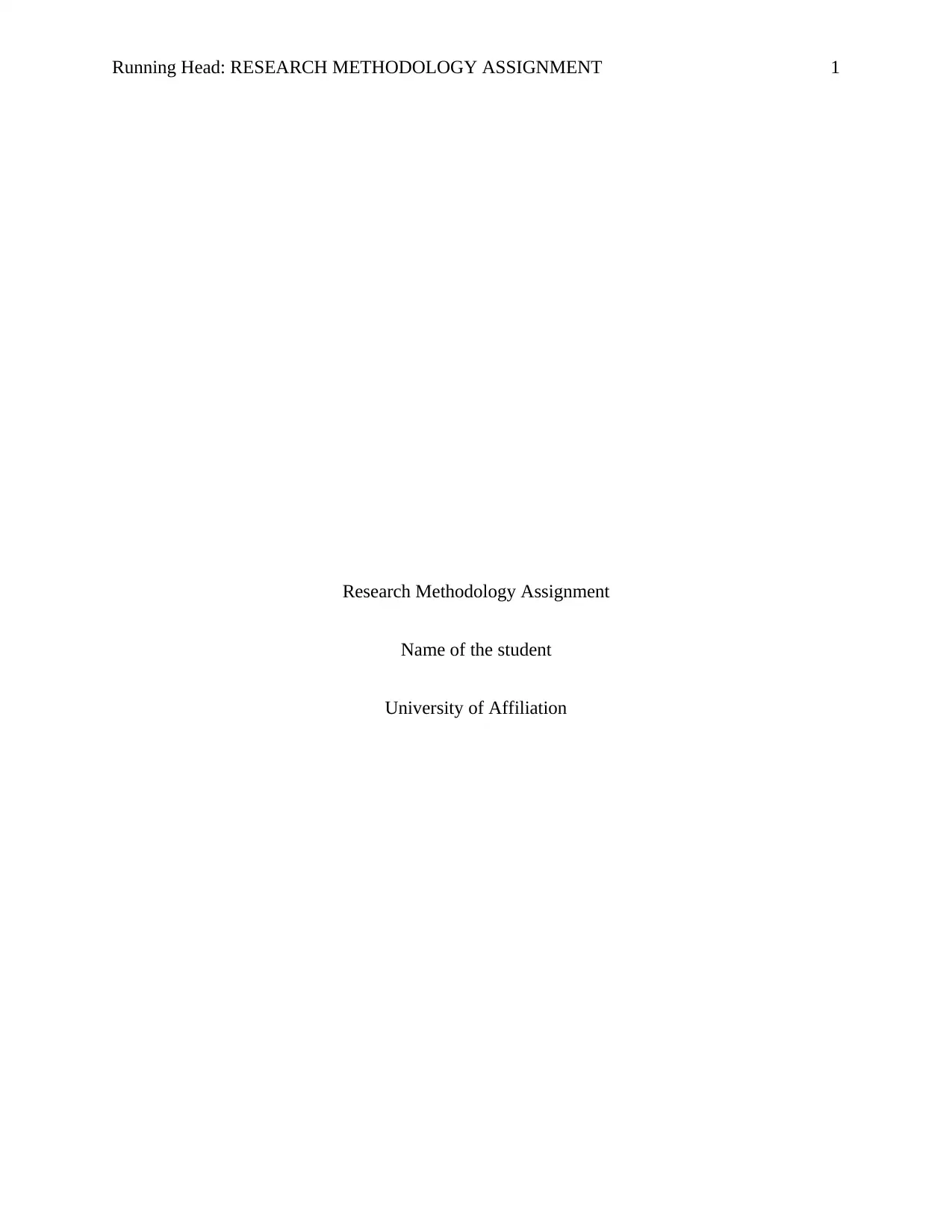
Running Head: RESEARCH METHODOLOGY ASSIGNMENT 1
Research Methodology Assignment
Name of the student
University of Affiliation
Research Methodology Assignment
Name of the student
University of Affiliation
Secure Best Marks with AI Grader
Need help grading? Try our AI Grader for instant feedback on your assignments.
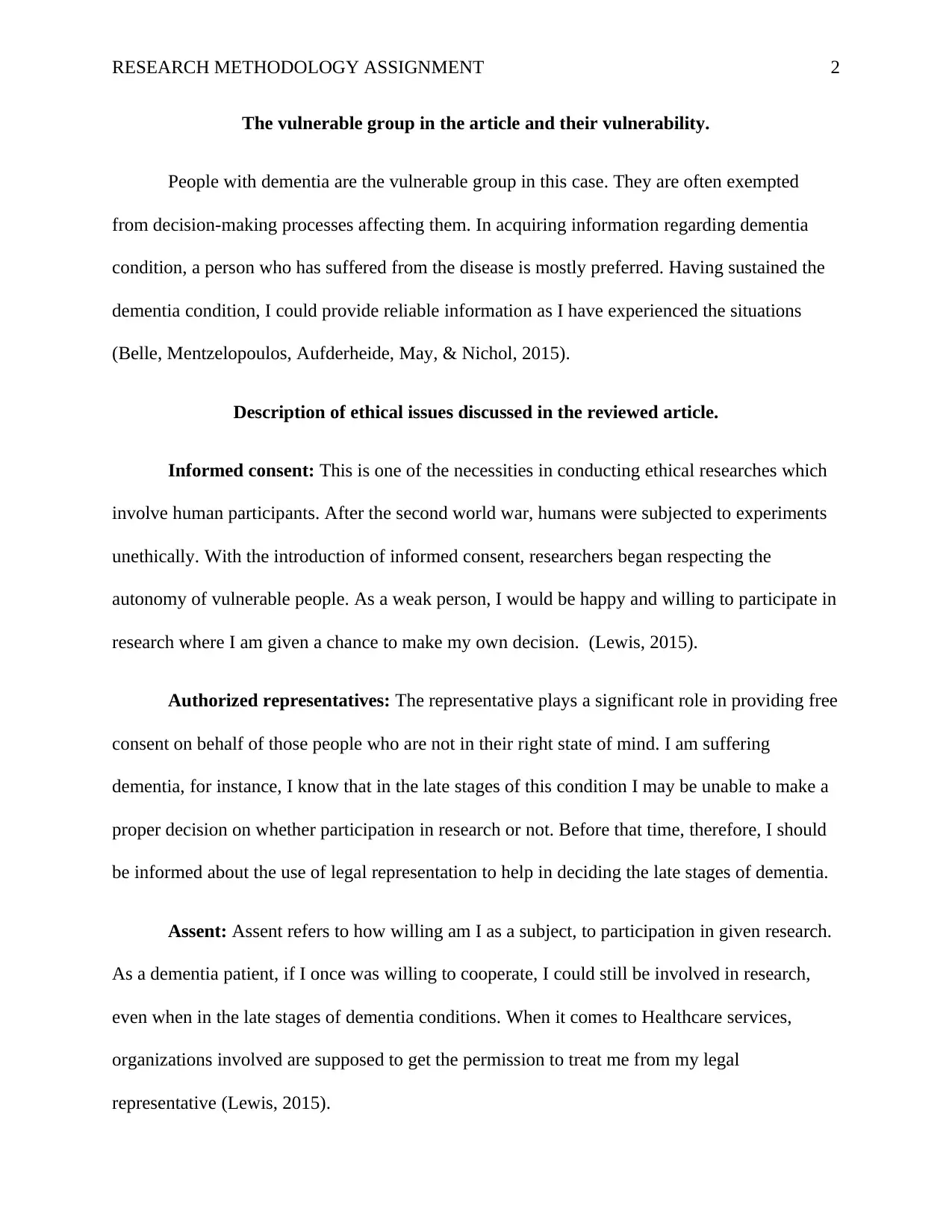
RESEARCH METHODOLOGY ASSIGNMENT 2
The vulnerable group in the article and their vulnerability.
People with dementia are the vulnerable group in this case. They are often exempted
from decision-making processes affecting them. In acquiring information regarding dementia
condition, a person who has suffered from the disease is mostly preferred. Having sustained the
dementia condition, I could provide reliable information as I have experienced the situations
(Belle, Mentzelopoulos, Aufderheide, May, & Nichol, 2015).
Description of ethical issues discussed in the reviewed article.
Informed consent: This is one of the necessities in conducting ethical researches which
involve human participants. After the second world war, humans were subjected to experiments
unethically. With the introduction of informed consent, researchers began respecting the
autonomy of vulnerable people. As a weak person, I would be happy and willing to participate in
research where I am given a chance to make my own decision. (Lewis, 2015).
Authorized representatives: The representative plays a significant role in providing free
consent on behalf of those people who are not in their right state of mind. I am suffering
dementia, for instance, I know that in the late stages of this condition I may be unable to make a
proper decision on whether participation in research or not. Before that time, therefore, I should
be informed about the use of legal representation to help in deciding the late stages of dementia.
Assent: Assent refers to how willing am I as a subject, to participation in given research.
As a dementia patient, if I once was willing to cooperate, I could still be involved in research,
even when in the late stages of dementia conditions. When it comes to Healthcare services,
organizations involved are supposed to get the permission to treat me from my legal
representative (Lewis, 2015).
The vulnerable group in the article and their vulnerability.
People with dementia are the vulnerable group in this case. They are often exempted
from decision-making processes affecting them. In acquiring information regarding dementia
condition, a person who has suffered from the disease is mostly preferred. Having sustained the
dementia condition, I could provide reliable information as I have experienced the situations
(Belle, Mentzelopoulos, Aufderheide, May, & Nichol, 2015).
Description of ethical issues discussed in the reviewed article.
Informed consent: This is one of the necessities in conducting ethical researches which
involve human participants. After the second world war, humans were subjected to experiments
unethically. With the introduction of informed consent, researchers began respecting the
autonomy of vulnerable people. As a weak person, I would be happy and willing to participate in
research where I am given a chance to make my own decision. (Lewis, 2015).
Authorized representatives: The representative plays a significant role in providing free
consent on behalf of those people who are not in their right state of mind. I am suffering
dementia, for instance, I know that in the late stages of this condition I may be unable to make a
proper decision on whether participation in research or not. Before that time, therefore, I should
be informed about the use of legal representation to help in deciding the late stages of dementia.
Assent: Assent refers to how willing am I as a subject, to participation in given research.
As a dementia patient, if I once was willing to cooperate, I could still be involved in research,
even when in the late stages of dementia conditions. When it comes to Healthcare services,
organizations involved are supposed to get the permission to treat me from my legal
representative (Lewis, 2015).
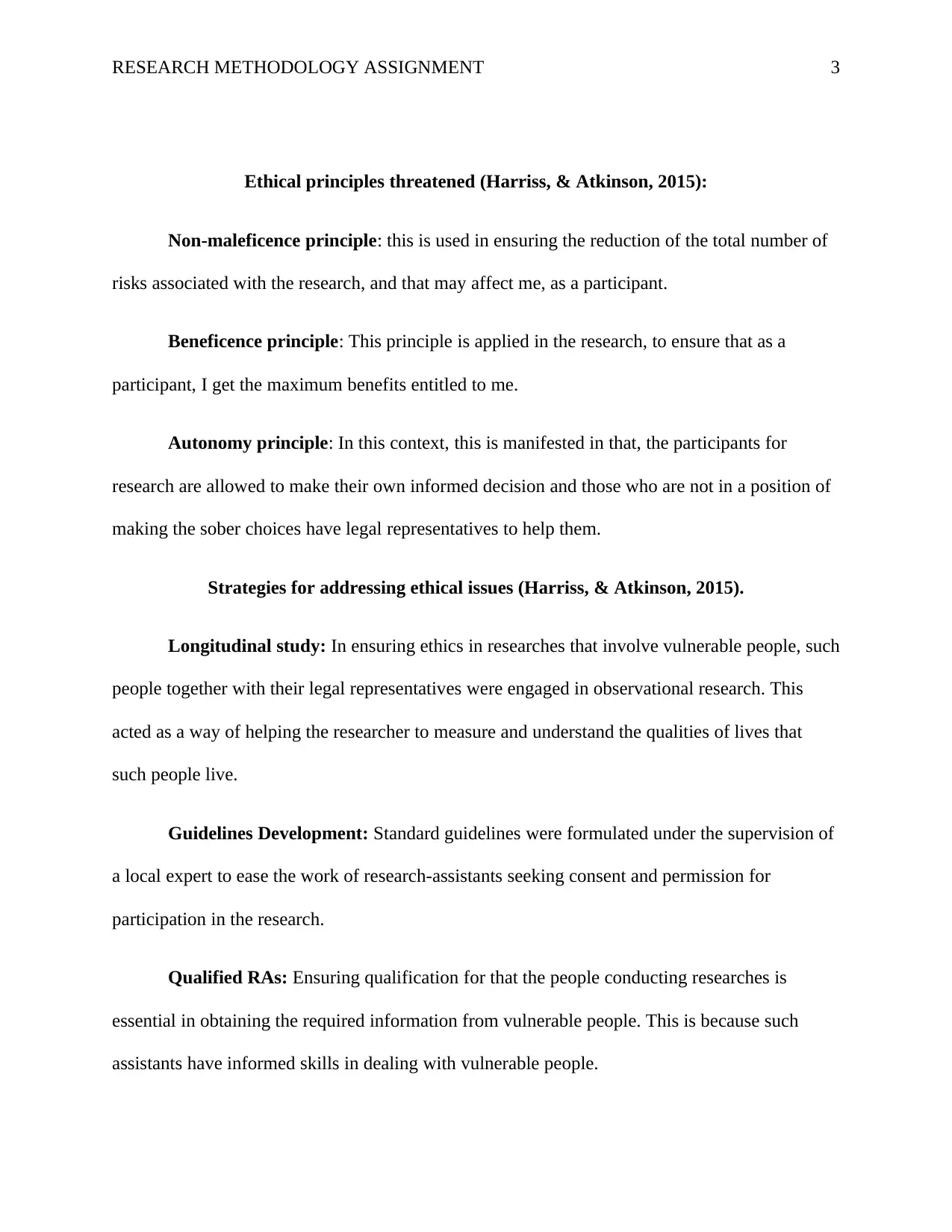
RESEARCH METHODOLOGY ASSIGNMENT 3
Ethical principles threatened (Harriss, & Atkinson, 2015):
Non-maleficence principle: this is used in ensuring the reduction of the total number of
risks associated with the research, and that may affect me, as a participant.
Beneficence principle: This principle is applied in the research, to ensure that as a
participant, I get the maximum benefits entitled to me.
Autonomy principle: In this context, this is manifested in that, the participants for
research are allowed to make their own informed decision and those who are not in a position of
making the sober choices have legal representatives to help them.
Strategies for addressing ethical issues (Harriss, & Atkinson, 2015).
Longitudinal study: In ensuring ethics in researches that involve vulnerable people, such
people together with their legal representatives were engaged in observational research. This
acted as a way of helping the researcher to measure and understand the qualities of lives that
such people live.
Guidelines Development: Standard guidelines were formulated under the supervision of
a local expert to ease the work of research-assistants seeking consent and permission for
participation in the research.
Qualified RAs: Ensuring qualification for that the people conducting researches is
essential in obtaining the required information from vulnerable people. This is because such
assistants have informed skills in dealing with vulnerable people.
Ethical principles threatened (Harriss, & Atkinson, 2015):
Non-maleficence principle: this is used in ensuring the reduction of the total number of
risks associated with the research, and that may affect me, as a participant.
Beneficence principle: This principle is applied in the research, to ensure that as a
participant, I get the maximum benefits entitled to me.
Autonomy principle: In this context, this is manifested in that, the participants for
research are allowed to make their own informed decision and those who are not in a position of
making the sober choices have legal representatives to help them.
Strategies for addressing ethical issues (Harriss, & Atkinson, 2015).
Longitudinal study: In ensuring ethics in researches that involve vulnerable people, such
people together with their legal representatives were engaged in observational research. This
acted as a way of helping the researcher to measure and understand the qualities of lives that
such people live.
Guidelines Development: Standard guidelines were formulated under the supervision of
a local expert to ease the work of research-assistants seeking consent and permission for
participation in the research.
Qualified RAs: Ensuring qualification for that the people conducting researches is
essential in obtaining the required information from vulnerable people. This is because such
assistants have informed skills in dealing with vulnerable people.
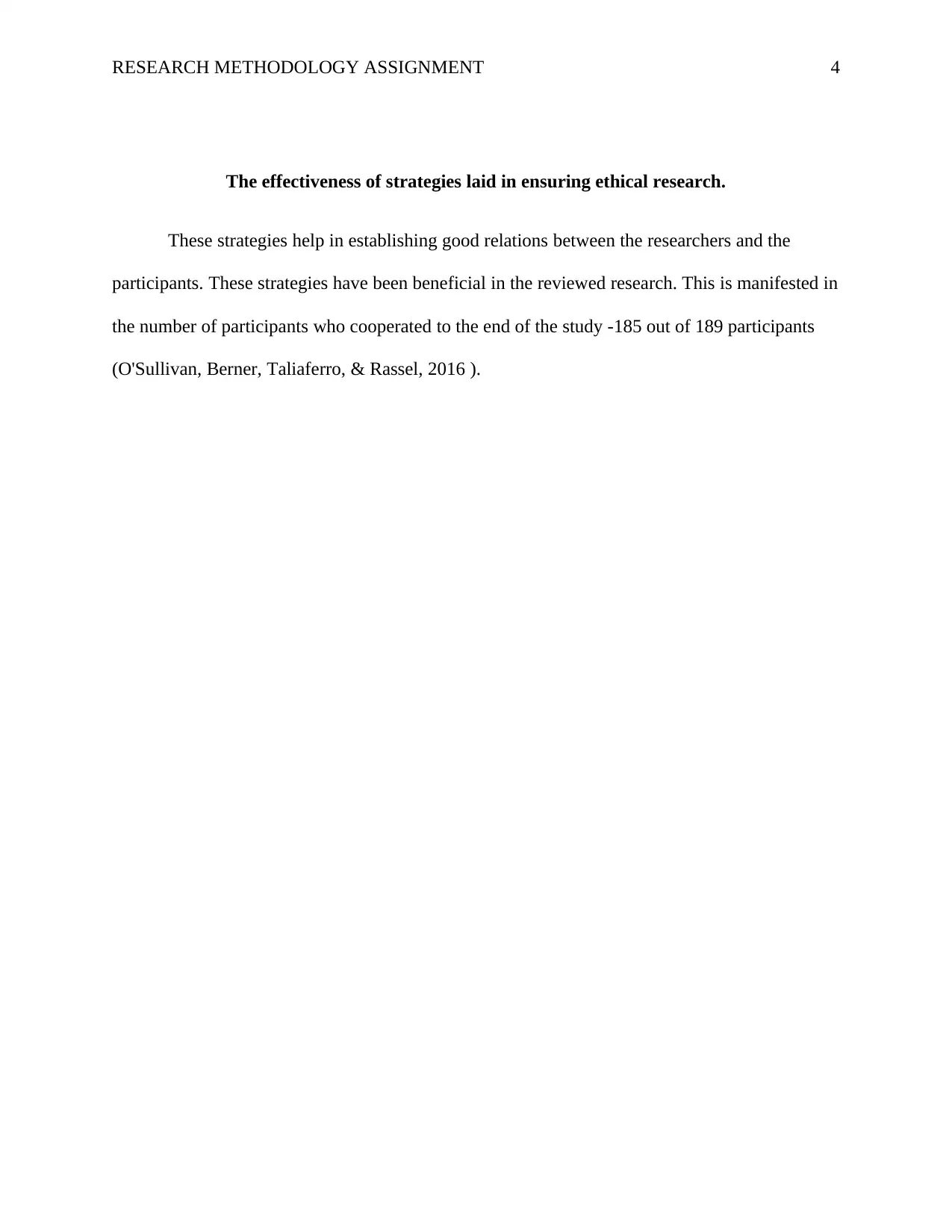
RESEARCH METHODOLOGY ASSIGNMENT 4
The effectiveness of strategies laid in ensuring ethical research.
These strategies help in establishing good relations between the researchers and the
participants. These strategies have been beneficial in the reviewed research. This is manifested in
the number of participants who cooperated to the end of the study -185 out of 189 participants
(O'Sullivan, Berner, Taliaferro, & Rassel, 2016 ).
The effectiveness of strategies laid in ensuring ethical research.
These strategies help in establishing good relations between the researchers and the
participants. These strategies have been beneficial in the reviewed research. This is manifested in
the number of participants who cooperated to the end of the study -185 out of 189 participants
(O'Sullivan, Berner, Taliaferro, & Rassel, 2016 ).
Secure Best Marks with AI Grader
Need help grading? Try our AI Grader for instant feedback on your assignments.
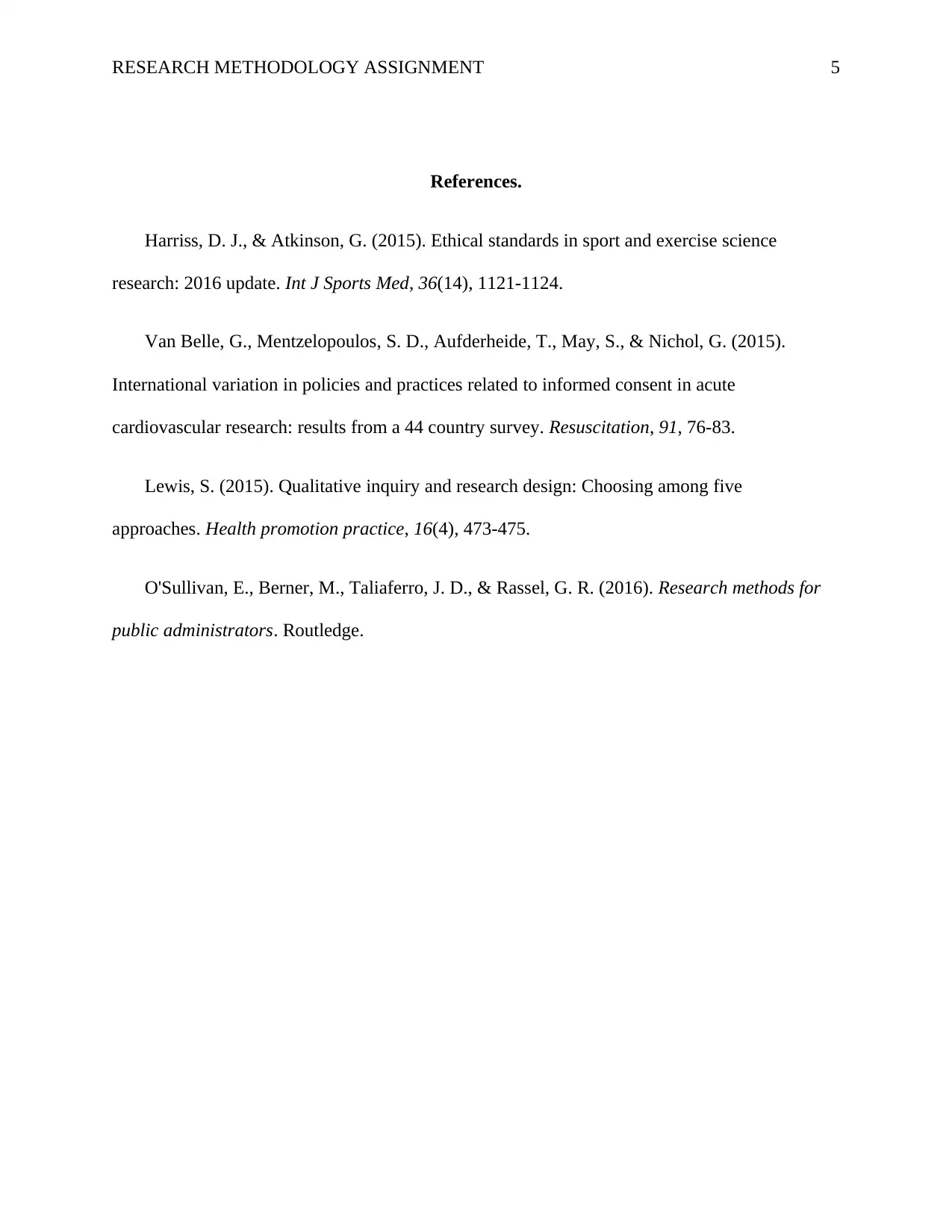
RESEARCH METHODOLOGY ASSIGNMENT 5
References.
Harriss, D. J., & Atkinson, G. (2015). Ethical standards in sport and exercise science
research: 2016 update. Int J Sports Med, 36(14), 1121-1124.
Van Belle, G., Mentzelopoulos, S. D., Aufderheide, T., May, S., & Nichol, G. (2015).
International variation in policies and practices related to informed consent in acute
cardiovascular research: results from a 44 country survey. Resuscitation, 91, 76-83.
Lewis, S. (2015). Qualitative inquiry and research design: Choosing among five
approaches. Health promotion practice, 16(4), 473-475.
O'Sullivan, E., Berner, M., Taliaferro, J. D., & Rassel, G. R. (2016). Research methods for
public administrators. Routledge.
References.
Harriss, D. J., & Atkinson, G. (2015). Ethical standards in sport and exercise science
research: 2016 update. Int J Sports Med, 36(14), 1121-1124.
Van Belle, G., Mentzelopoulos, S. D., Aufderheide, T., May, S., & Nichol, G. (2015).
International variation in policies and practices related to informed consent in acute
cardiovascular research: results from a 44 country survey. Resuscitation, 91, 76-83.
Lewis, S. (2015). Qualitative inquiry and research design: Choosing among five
approaches. Health promotion practice, 16(4), 473-475.
O'Sullivan, E., Berner, M., Taliaferro, J. D., & Rassel, G. R. (2016). Research methods for
public administrators. Routledge.
1 out of 5
Your All-in-One AI-Powered Toolkit for Academic Success.
+13062052269
info@desklib.com
Available 24*7 on WhatsApp / Email
![[object Object]](/_next/static/media/star-bottom.7253800d.svg)
Unlock your academic potential
© 2024 | Zucol Services PVT LTD | All rights reserved.


